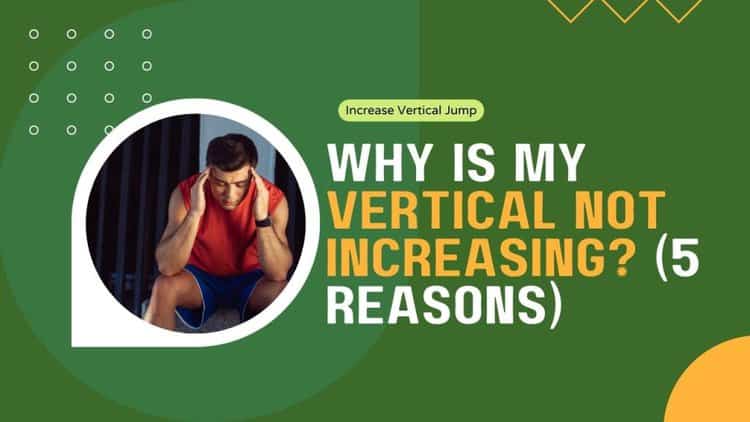There’s nothing more frustrating than training super hard for weeks, only to test your vertical jump to see that you didn’t gain even a fraction of an inch…
I’ve been there, many times.
The good news is that there’s usually a pretty simple reason why.
Chances are you’re doing one or more of the five things that I’ll be discussing today that will cause this stagnated progress.
Now if your vertical jump is actually going down, you could be making some very serious errors with your training…
If this is you, be sure to read my article explaining why your vertical jump is decreasing.
5 Reasons Your Vertical Jump Isn’t Increasing
I’ve listed these in order of the most likely causes for a plateau in your vertical jump training, so be sure to pay close attention to the first few reasons and make sure you’ve not fallen into any of these traps.
1. You’re Probably Overreaching
If you’re someone who is doing a lot of jumping 3+ times a week, as well as lifting weights 2-3 or more times a week, you’re probably overreaching.
By this I mean you’re creating a layer of systemic fatigue that’s causing you to underperform relative to a well rested state.

This is something I was guilty of in high school.
I thought more was better.
I thought the answer was to jump more, squat heavier, and more often.
If I wasn’t seeing the results I wanted, I figured the only option was to work harder.
And so a perpetual cycle of overreaching (probably overtraining) began and I was chronically fatigued throughout high school.
Fatigue masks your true vertical jumping ability.
If you’re an athlete who trains a lot, you’ll always be fatigued to some degree.
If I could wave a magic wand to rid you of fatigue and allow you to be fully recovered, you would instantly jump higher.
Guaranteed.
When it comes to vertical jump training, less is quite often more.
Try to keep your training to 3-5 days a week.
Get at least two full days of rest each week.
I know a lot of you won’t want to hear that because your schedules simply don’t allow it, but it’s the only way to flush this constant build up of fatigue, so you can perform at your full capacity.
If that means not trying out for a team or not joining a squad, then so be it.
Don’t overcook your training schedule.
2. You’re Not Lifting Heavier
Are you stagnating in the gym?
When was the last time you meaningfully increased your squat?

Vertical jump is really simple.
It’s Strength X Speed = Power.
Power = a bigger vertical jump.
So it follows that to increase your vertical jump you need to increase either your strength or your speed, or both.
To increase your strength, you need to progressively overload by lifting heavier weights.
If you’re not actively focusing on increasing your lifts in the gym, you won’t increase your strength.
As such, your power won’t go up much and nor will your vertical.
Set a goal to add 15lbs to your back squat over the next couple months.
Then flush your body of fatigue completely.
And then try tell me your vertical jump still isn’t increasing!
3. Your Technique Sucks
Let’s suppose you’re not overtraining and you are consistently making progress in the gym, but you’ve still hit a plateau with your vertical jump… what gives?

Now would be a perfect time to analyze your vertical jump technique to look for inefficiencies in your mechanics.
At least 90% of non-professional or non-elite athletes have serious biomechanical issues with their vertical jump.
This is holding them back and they don’t even know it!
The good news is that once you know what you’re looking for, it’s super easy to correct your mistakes.
In many cases you’ll jump higher instantly.
I would strongly recommend reading my article discussing the mechanics of the approach jump to ensure your technique is optimized, as it almost certainly isn’t!
4. You Lack Patience
So you’re definitely not overtraining, you are consistently getting stronger, and you’ve made some improvements to your technique…
If you’re a beginner, chances are you’re on the brink of seeing some massive improvements to your vertical jump.
Just keep working hard and the results will come, I promise.
If you’ve been at this thing for a while, you can probably appreciate that vertical jump gains are inconsistent at the best of times.
It’s really common for elite athletes to go weeks and months without making any noticeable progress on their jump.
There’s just so many factors to account for.
As training age increases, your rate of progress will slow down drastically to the point where you’re training full time just to maintain the vertical you have!
Check out my full article explaining how long it takes to meaningfully increase your vertical jump.
If you’re nailing everything we’ve talked about, you shouldn’t be far away from seeing progress, so just remain patient and stick with it for a while longer.
5. Your Diet, Sleep, & Consistency Suck
If you’re getting this stuff wrong, you’re not going to make any progress.
Period.
If your diet sucks, you aren’t giving your body the nutrition it needs to recover properly.
Same thing goes for sleep.
If you’re not recovering properly, then you’re at risk of overreaching: refer to reason number one.
Diet and sleep are so important in this game.
Chances are you already know whether you need to improve on this or not.
Check out this article if you need some diet advice for vertical jump training.
The final thing is consistency.
You’re not going to make vertical jump gains if you’re doing everything right for a few months before going on vacation for a week and letting yourself go…
You can lose months of progress in the gym from just a week of neglecting your body and diet.
The athletes that see real consistent gains over the long run are the athletes who show up consistently and act like professionals.
If they make a mistake, they correct it immediately and get themselves back on track.
6. Bonus: Your Vertical Jump Program Sucks!
I’ve recently spent the last few months researching and testing each of the best vertical jump programs on the market.
While you’ll probably make decent gains on any vertical jump program, certain programs will definitely lead to bigger gains faster.
Make sure you check out my roundup of the current best performing vertical jump programs for 2023!
And if you don’t yet have a vertical jump program… why?
Just why?
Parting Thoughts
If you’re dealing with a vertical jump plateau and that number simply won’t go up, you need to be real honest with yourself.
Are you possibly training too frequently each week, masking your true ability in a layer of fatigue?
When it comes to vertical jump training, less is almost always more.
Are you getting stronger in the gym every month or are you simply going through the motions?
You should be tracking your workouts so you can objectively see whether you’re making progress.
Have you taken a good hard look at some footage of you jumping recently?
Everyone likes to think they have perfect technique already, but almost no one does.
That’s the quickest way to bust through a vertical jump plateau: learn how to actually jump properly!
Is your diet and sleep on point?
How much stress is in your life?
And how consistent and diligent would you say you are with your training?
Be honest.
If you’ve genuinely taken a good hard look at yourself in the mirror and can say you’re doing really good with all of the above, then all that is left for you to do is be patient.
Don’t expect your vertical to go up every week.
Heck, don’t expect it to go up every other week either!
That’s not how it works.
Don’t be disappointed if you stagnate for an entire month or even two!
This is perfectly normal.
Simply keep doing all of the small things we’ve talked about and you’ll be jumping higher before you know it!
























